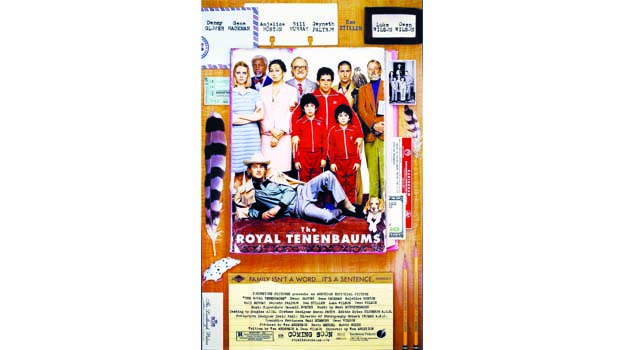Film Talk
The Royal Tenenbaums

The Tenenbaums occupy a big house in a kind of dreamy New York. It has enough rooms for each to hide and nurture a personality incompatible with the others. Royal Tenenbaum (Gene Hackman), the patriarch, left home abruptly some years before and has been living in a hotel, on credit, ever since. There was never actually a divorce. His wife Etheline (Anjelica Huston) remains at home with their three children, who were all child prodigies and have grown into adult neurotics. There's Chas (Ben Stiller), who was a financial whiz as a kid; Margot (Gwyneth Paltrow), who was adopted, and won a big prize for writing a school play, and Richie (Luke Wilson), once a tennis champion.
All three come with various partners, children and friends. The most memorable are Raleigh St. Clair (Bill Murray), a bearded intellectual who has been married to Margot for years but does not begin to know her; Eli Cash (Owen Wilson), who lived across the street, became like a member of the family, and writes best-selling Westerns that get terrible reviews; Henry Sherman (Danny Glover), who was Etheline's accountant for 10 years until they suddenly realized they were in love, and such satellites as Pagoda (Kumar Pallana), Royal's faithful servant (who once in India tried to murder Royal and then rescued him from ... himself ...) and the bellboy Dusty (Seymour Cassel), who impersonates a doctor when Royal fakes a fatal illness.
Trying to understand the way this flywheel comedy tugs at the heartstrings, I reflected that eccentricity often masks deep loneliness. All the Tenenbaums are islands entire of themselves. Consider that Margot has been a secret smoker since she was 12. Why bother? Nobody else in the family cares, and when they discover her deception they hardly notice. Her secrecy was part of her own strategy to stand outside the family, to have something that was her own.
"The Royal Tenenbaums" is at heart profoundly silly, and loving. That's why it made me think of Wodehouse. It stands in amazement as the Tenenbaums and their extended family unveil one strategy after another to get attention, carve out space, and find love. It doesn't mock their efforts, dysfunctional as they are, because it understands them--and sympathizes. The Tenenbaums occupy a big house in a kind of dreamy New York. It has enough rooms for each to hide and nurture a personality incompatible with the others. Royal Tenenbaum (Gene Hackman), the patriarch, left home abruptly some years before and has been living in a hotel, on credit, ever since. There was never actually a divorce. His wife Etheline (Anjelica Huston) remains at home with their three children, who were all child prodigies and have grown into adult neurotics. There's Chas (Ben Stiller), who was a financial whiz as a kid; Margot (Gwyneth Paltrow), who was adopted, and won a big prize for writing a school play, and Richie (Luke Wilson), once a tennis champion.
All three come with various partners, children and friends. The most memorable are Raleigh St. Clair (Bill Murray), a bearded intellectual who has been married to Margot for years but does not begin to know her; Eli Cash (Owen Wilson), who lived across the street, became like a member of the family, and writes best-selling Westerns that get terrible reviews; Henry Sherman (Danny Glover), who was
Etheline's accountant for 10 years until they suddenly realized they were in love, and such satellites as Pagoda (Kumar Pallana), Royal's faithful servant (who once in India tried to murder Royal and then rescued him from ... himself ...) and the bellboy Dusty (Seymour Cassel), who impersonates a doctor when Royal fakes a fatal illness.
Consider, for example, what happens after Royal gets bounced out of his latest hotel and moves back home. His wife doesn't want him and Chas despises him (for stealing from his safety deposit box), so Royal stealthily moves in with a hospital bed, intravenous tubes, private medical care, and Seymour Cassel shaking his head over the prognosis. When this strategy is unmasked, he announces he wants to get to know his grandkids better--wants to teach them to take chances. So he instructs Chas' kids in shoplifting, playing in traffic and throwing things at taxicabs.
"The Royal Tenenbaums" is at heart profoundly silly, and loving. That's why it made me think of Wodehouse. It stands in amazement as the Tenenbaums and their extended family unveil one strategy after another to get attention, carve out space, and find love. It doesn't mock their efforts, dysfunctional as they are, because it understands them--and sympathizes.




